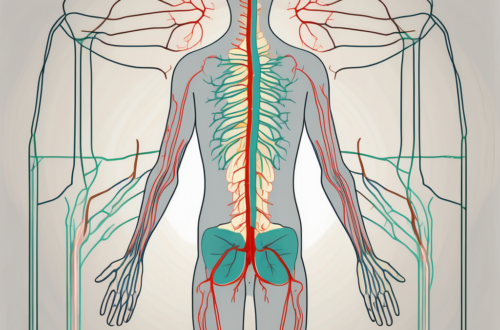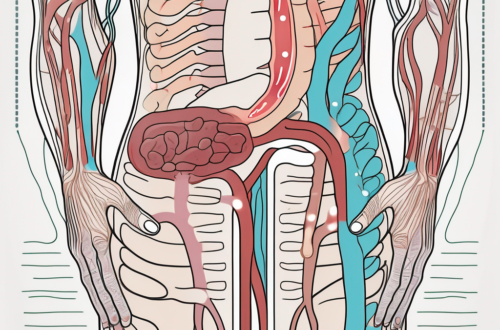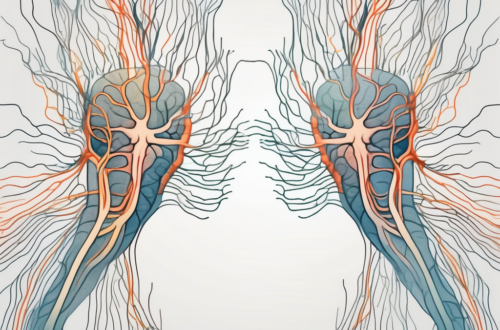The parasympathetic nervous system, an integral component of our autonomic nervous system, plays a crucial role in maintaining the balance of our bodily functions. From regulating heart rate to aiding digestion, this intricate system is essential for overall well-being. However, disruptions in the parasympathetic nervous system can lead to various disorders and impact the quality of life. Fortunately, there are effective treatments available to address these concerns and restore harmony within the body. In this comprehensive guide, we will explore the parasympathetic nervous system, common disorders associated with it, different treatment options, the science behind these treatments, factors to consider when choosing the right treatment, and the exciting future of parasympathetic nerve treatment.
Understanding the Parasympathetic Nervous System
Before delving into the world of parasympathetic nerve treatment, it is essential to have a clear understanding of the parasympathetic nervous system itself. This branch of the autonomic nervous system works in opposition to the sympathetic nervous system, which controls the body’s fight-or-flight response. The parasympathetic nervous system, on the other hand, promotes rest, relaxation, and the conservation of energy.
The parasympathetic nervous system primarily operates through the vagus nerve, which extends from the brainstem to various organs such as the heart, lungs, and digestive system. The impulses carried by this nerve initiate a cascade of responses that promote digestion, slow heart rate, and decrease blood pressure.
When it comes to understanding the parasympathetic nervous system, it is important to recognize its role in maintaining homeostasis in the body. By regulating heart rate, blood pressure, and digestion, this system ensures that our bodily functions operate smoothly and efficiently. Without the parasympathetic nervous system, our bodies would be in a constant state of heightened arousal, leading to detrimental effects on our overall health and well-being.
Furthermore, the parasympathetic nervous system is involved in promoting restful sleep, reducing anxiety levels, and supporting healthy bowel movements. It plays a crucial role in helping us unwind after a long day, allowing our bodies and minds to rejuvenate and recover.
The Role of the Parasympathetic Nervous System
One of the key functions of the parasympathetic nervous system is to maintain homeostasis in the body. By regulating heart rate, blood pressure, and digestion, this system ensures that our bodily functions operate smoothly and efficiently. Additionally, the parasympathetic nervous system is involved in promoting restful sleep, reducing anxiety levels, and supporting healthy bowel movements.
When we engage in activities that activate the parasympathetic nervous system, such as deep breathing exercises, meditation, or gentle stretching, we stimulate the relaxation response. This response triggers a cascade of physiological changes that promote a sense of calm and well-being. It allows our bodies to rest and repair, reducing the wear and tear caused by chronic stress and anxiety.
Moreover, the parasympathetic nervous system also plays a crucial role in our social interactions. It helps us connect with others on a deeper level by enabling us to experience empathy, compassion, and trust. When the parasympathetic nervous system is functioning optimally, we are more likely to form meaningful relationships and experience a sense of belonging.
Common Disorders of the Parasympathetic Nervous System
Despite its vital role, the parasympathetic nervous system can experience dysregulation, leading to various disorders. Some of the most commonly observed parasympathetic nerve-related disorders include:
- Bradycardia: A condition characterized by an abnormally slow heart rate. This can lead to symptoms such as fatigue, dizziness, and fainting.
- Gastrointestinal Disorders: Disorders such as irritable bowel syndrome (IBS) and gastroparesis can arise due to impaired parasympathetic nerve function. These conditions can cause symptoms like abdominal pain, bloating, and irregular bowel movements.
- Urinary Issues: Parasympathetic nerve dysfunction can cause urinary retention or incontinence. This can be distressing and affect a person’s quality of life.
If you experience symptoms associated with these disorders or suspect any issues with your parasympathetic nervous system, it is crucial to consult with a healthcare professional for a proper diagnosis and treatment plan. They can help identify the underlying cause of your symptoms and recommend appropriate interventions to restore balance to your parasympathetic nervous system.
Overall, understanding the parasympathetic nervous system is essential for maintaining optimal health and well-being. By nurturing this branch of the autonomic nervous system, we can promote rest, relaxation, and overall vitality in our lives.
The Importance of Effective Parasympathetic Nerve Treatment
Now that we understand the significance of the parasympathetic nervous system, let’s explore why effective treatment is essential for maintaining optimal health and well-being.
The parasympathetic nervous system plays a crucial role in regulating various bodily functions, such as digestion, rest, and relaxation. It works in opposition to the sympathetic nervous system, which is responsible for the body’s fight-or-flight response. When the parasympathetic nervous system is functioning optimally, it promotes a state of calmness and restoration, allowing the body to heal and rejuvenate.
However, when this system is compromised, it can lead to an array of symptoms and complications. Disorders such as parasympathetic neuropathy, autonomic dysfunction, and vagus nerve disorders can disrupt the normal functioning of the parasympathetic nervous system. These conditions can manifest in various ways, including digestive issues, cardiovascular problems, respiratory disturbances, and sleep disorders.
Impact on Overall Health
A well-functioning parasympathetic nervous system is vital for maintaining overall health. When this system is compromised, it can have far-reaching effects on the body. For example, digestive issues such as bloating, constipation, and acid reflux can occur when the parasympathetic nervous system fails to stimulate the proper release of digestive enzymes and promote efficient nutrient absorption.
Furthermore, the parasympathetic nervous system plays a crucial role in regulating heart rate, blood pressure, and respiratory function. Dysfunction in this system can lead to cardiovascular problems, such as irregular heart rhythms, low blood pressure, and poor oxygenation. These issues can have serious implications for one’s overall well-being and may require effective parasympathetic nerve treatment to restore balance.
Enhancing Quality of Life
Disorders of the parasympathetic nervous system can significantly impact daily life. Symptoms such as chronic fatigue, digestive issues, and sleep disturbances can take a toll on one’s physical and emotional well-being. The constant feeling of exhaustion and the inability to get restful sleep can lead to decreased productivity, impaired cognitive function, and mood disturbances.
Effective treatment options aim to improve the quality of life by alleviating symptoms and restoring the body’s natural balance. For instance, therapies such as vagus nerve stimulation, relaxation techniques, and lifestyle modifications can help activate the parasympathetic nervous system and promote relaxation and healing. These interventions can provide relief from symptoms, enhance sleep quality, and improve overall well-being.
In conclusion, effective parasympathetic nerve treatment is crucial for maintaining optimal health and well-being. By addressing the underlying causes of parasympathetic nervous system dysfunction and implementing appropriate treatment strategies, individuals can restore balance, alleviate symptoms, and enhance their overall quality of life.
Different Types of Parasympathetic Nerve Treatments
Parasympathetic nerve treatments can take various forms, depending on the specific disorder and its underlying causes. When it comes to treating parasympathetic nerve-related issues, healthcare professionals may suggest one or a combination of the following approaches:
Medications and Supplements
Pharmaceutical interventions, such as medications and supplements, can be prescribed to address specific symptoms or target the parasympathetic nervous system directly. Medications may include cholinergic agents to stimulate parasympathetic function, while supplements like vitamins and minerals can support overall nerve health.
When it comes to medications, there are several options available. One common medication used to stimulate parasympathetic function is acetylcholine. Acetylcholine is a neurotransmitter that plays a crucial role in the parasympathetic nervous system, helping to regulate bodily functions such as digestion, heart rate, and glandular secretion. By increasing the levels of acetylcholine in the body, medications can help restore balance to the parasympathetic nervous system.
In addition to medications, supplements can also play a role in supporting parasympathetic nerve health. For example, vitamin B12 is known to be essential for nerve function and can help maintain the health of the parasympathetic nervous system. Other minerals like magnesium and zinc can also contribute to nerve health and function.
Therapies and Procedures
In addition to medications, various non-pharmacological treatment options are available to manage parasympathetic nerve disorders. These can include physical therapies, such as massage therapy and acupuncture, as well as procedures like vagal nerve stimulation, which involves the implantation of a device to stimulate the vagus nerve.
Massage therapy is a popular form of physical therapy that can help relax the body and relieve tension in the muscles. By targeting specific areas of the body, massage therapists can help stimulate the parasympathetic nervous system, promoting relaxation and reducing stress levels. Acupuncture, on the other hand, involves the insertion of thin needles into specific points on the body to stimulate the flow of energy and restore balance to the nervous system.
Vagal nerve stimulation is a more invasive procedure that is typically reserved for severe cases of parasympathetic nerve disorders. During this procedure, a small device is surgically implanted in the chest or neck to deliver electrical impulses to the vagus nerve, which helps regulate various bodily functions. By stimulating the vagus nerve, this procedure can help alleviate symptoms associated with parasympathetic nerve disorders.
It’s important to note that the choice of treatment will depend on the specific condition and the individual’s overall health. Healthcare professionals will assess the severity of the disorder and consider various factors before recommending the most appropriate treatment approach.
The Science Behind Parasympathetic Nerve Treatments
Understanding the scientific principles behind parasympathetic nerve treatments can help us make informed decisions when choosing the right approach. While the exact mechanisms can vary depending on the treatment modality, the primary goal is to restore balance within the parasympathetic nervous system.
The parasympathetic nervous system, often referred to as the “rest and digest” system, is responsible for promoting relaxation, digestion, and overall homeostasis in the body. When this system becomes imbalanced, it can lead to a variety of health issues, including anxiety, digestive disorders, and cardiovascular problems.
Parasympathetic nerve treatments work by targeting the underlying causes of dysfunction within the parasympathetic nervous system. For example, medications may increase the production or release of neurotransmitters that promote parasympathetic function, while physical therapies aim to stimulate the vagus nerve to improve its signaling.
One commonly used medication in parasympathetic nerve treatments is acetylcholine, a neurotransmitter that plays a crucial role in the parasympathetic system. By increasing the levels of acetylcholine in the body, medications can help restore balance and alleviate symptoms associated with parasympathetic dysfunction.
How Treatments Work
Parasympathetic nerve treatments work by targeting the underlying causes of dysfunction within the parasympathetic nervous system. For example, medications may increase the production or release of neurotransmitters that promote parasympathetic function, while physical therapies aim to stimulate the vagus nerve to improve its signaling.
Physical therapies, such as deep breathing exercises, yoga, and meditation, can activate the relaxation response and stimulate the parasympathetic nervous system. These practices help reduce stress, lower heart rate, and improve digestion, ultimately restoring balance to the body.
In addition to medications and physical therapies, lifestyle modifications can also play a significant role in parasympathetic nerve treatments. Adopting a healthy diet rich in fruits, vegetables, and whole grains can provide the necessary nutrients to support optimal parasympathetic function. Regular exercise, adequate sleep, and stress management techniques are also crucial in maintaining a healthy parasympathetic nervous system.
Latest Research in Parasympathetic Nerve Treatment
The field of parasympathetic nerve treatment is continually evolving, with ongoing research shedding light on new approaches and potential breakthroughs. Researchers are exploring innovative techniques, such as bioelectronic medicine and targeted therapies, to enhance treatment effectiveness and precision.
One promising area of research is the use of bioelectronic medicine, which involves the use of electrical stimulation to modulate the activity of specific nerves in the body. By precisely targeting the parasympathetic nervous system, bioelectronic medicine holds great potential in treating a wide range of conditions, including chronic pain, inflammatory disorders, and gastrointestinal disorders.
Targeted therapies, on the other hand, focus on identifying and addressing the specific causes of parasympathetic dysfunction in individual patients. This personalized approach allows for more tailored treatments and better outcomes. By understanding the unique factors contributing to parasympathetic imbalance, healthcare providers can develop targeted interventions that address the root cause of the problem.
Stay informed about the latest advancements in parasympathetic nerve treatment by following reputable scientific journals and consulting with experts in the field. As research continues to expand our understanding of the parasympathetic nervous system, new treatment options and strategies will emerge, providing hope for those struggling with parasympathetic dysfunction.
Choosing the Right Parasympathetic Nerve Treatment
When it comes to selecting the appropriate treatment for parasympathetic nerve disorders, there are several factors to consider:
Factors to Consider
Individual needs and medical history play a crucial role in determining the most suitable treatment option. Factors such as the severity of symptoms, potential side effects, and personal preferences should all be taken into account. Consulting with a healthcare professional is crucial for a comprehensive evaluation and tailored treatment plan.
One important factor to consider is the severity of symptoms. Parasympathetic nerve disorders can range from mild to severe, and the treatment approach may vary accordingly. Mild cases may only require lifestyle modifications and self-care measures, while severe cases may necessitate more aggressive interventions such as medication or surgery.
Another factor to consider is the potential side effects of different treatment options. Some medications used to treat parasympathetic nerve disorders may have side effects that can impact an individual’s quality of life. It is important to weigh the potential benefits against the potential risks and discuss any concerns with a healthcare professional.
Personal preferences should also be taken into account when choosing a treatment option. Some individuals may prefer non-invasive treatments such as physical therapy or acupuncture, while others may be more open to medication or surgical interventions. It is important to have an open and honest discussion with a healthcare professional about personal preferences to ensure the chosen treatment aligns with individual needs and goals.
Consulting with Healthcare Professionals
While this guide provides valuable information, it is important to remember that it does not substitute professional medical advice. Each individual’s situation is unique, and consulting with a qualified healthcare professional is paramount. They can assess your specific condition, provide accurate diagnosis, and guide you towards the most effective treatment options.
When consulting with a healthcare professional, they will conduct a thorough evaluation of your symptoms and medical history. This may involve a physical examination, laboratory tests, and imaging studies to determine the underlying cause of your parasympathetic nerve disorder. Once a diagnosis is made, the healthcare professional will discuss the treatment options available and their potential benefits and risks.
It is important to ask questions and voice any concerns during the consultation. Understanding the treatment options and their implications is essential for making an informed decision. The healthcare professional will work with you to develop a personalized treatment plan that takes into account your individual needs, preferences, and goals.
Additionally, it may be beneficial to seek a second opinion from another healthcare professional to ensure that all available treatment options have been explored and considered. Parasympathetic nerve disorders can be complex, and different healthcare professionals may have varying approaches and expertise.
Remember, choosing the right treatment for parasympathetic nerve disorders is a collaborative process between you and your healthcare professional. By working together, you can make an informed decision that best addresses your unique needs and leads to improved quality of life.
The Future of Parasympathetic Nerve Treatment
Exciting advancements are on the horizon for parasympathetic nerve treatment. Emerging technologies, such as neurostimulation devices, offer promising possibilities for precise and targeted interventions. Researchers are also exploring innovative ways to modulate the parasympathetic nervous system using genetic therapies and regenerative medicine techniques.
Emerging Treatments
New treatment options are continuously being researched and developed. As science and technology progress, we can look forward to novel therapies that may revolutionize the field of parasympathetic nerve treatment. Stay updated and discuss these emerging treatments with your healthcare provider to explore the best options for your specific needs.
Advances in Technology and Research
The combination of advances in technology and ongoing scientific research holds vast potential for uncovering new insights into the parasympathetic nervous system and the most effective treatment approaches. By staying informed and engaged with the latest developments, individuals and healthcare professionals can collaborate to achieve better outcomes for parasympathetic nerve disorders.
To conclude, effective parasympathetic nerve treatment is crucial for restoring balance and alleviating the symptoms associated with disorders affecting this vital system. By understanding the role of the parasympathetic nervous system, exploring available treatment options, considering individual factors, and consulting with healthcare professionals, individuals can make informed decisions that align with their specific needs. With ongoing advancements and research, the future of parasympathetic nerve treatment looks promising, offering hope for improved outcomes and an enhanced quality of life.





